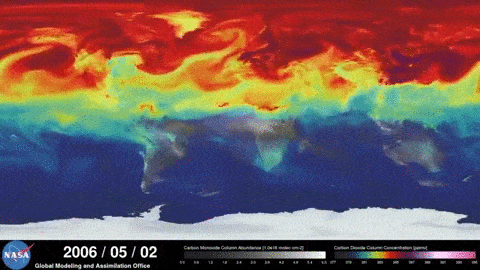Carbon does its worse work 'within 10 years'
In a study that could have important ramifications on estimating the impacts, costs and benefits of reducing carbon dioxide emissions, new research shows that CO2 brings peak heat within a decade of being emitted, with the effects then lingering 100 years or more into the future.
Figure 1: Spring atmospheric CO2 concentrations, when they're usually at their peak.

Credit: NASA
The research, published Wednesday in Environmental Research Letters, provides policymakers and economists with a new perspective on how fast human carbon emissions heat the planet. Back-of-the-envelope estimates for how long it takes for a given puff of CO2 to crank up the heat have generally been from 40-50 years. But the new study shows that the timeframe for CO2 emissions to reach their maximum warming potential is likely closer to 10 years.
“The way we talk about climate change is often, ‘oh, we're really making emissions cuts for the sake of our children or grandchildren because the effects won't be felt for decades. But the implications are that there's certainly benefits that can be reaped by people making decisions today,” Katharine Ricke, a research fellow from Stanford who led the study, said. “The difference for an economist or a policymaker between something that happens 10 years from now or 40 years from now is a big deal.”
The new study provides economists with a key piece of information as they try to pinpoint the true cost of carbon emissions. That cost – sometimes referred to as the social cost of carbon – can be used to weigh the benefits and costs of regulations.
There's currently a lot of uncertainty around that cost, but most researchers agree it's likely to rise as estimates of climate impacts, such as sea level rise, are refined and new ones, like damage from tropical cyclones, are discovered. Interest from economists about those estimates is what Ricke said motivated her to pursue this study.
By revealing that CO2 has such a rapid warming effect on the planet, the study said that “people alive today are very likely to benefit from emissions avoided today.” Ricke said that provides a clearer incentive for policymakers and politicians – and the people who vote for them – to consider actions for reducing emissions.
“We're more used to making decisions about things that will happen 10 years in the future than things that will happen in 40 years,” she said.
But the maximum warming impact of CO2 is only a single note in an otherwise long symphony of climate change. Ricke and her collaborator, Ken Caldeira, created 6000 projections using advanced climate models to test when CO2 emissions increased warming and to see how long those impacts lasted. Their results confirm something scientists have long said: that the warming effects of CO2 emissions will linger for decades and even centuries.
Figure 2: The warming impact of CO2 after it's emitted through 100 years.

Credit: Ricke and Caldeira, 2014
Pieter Tans, a senior scientist at the Earth System Research Laboratory, said that the long view was more important than focusing on the maximum warming, in part because the warming wasn't notable enough to even be considered a peak.
“It reaches a peak but its barely a peak. It's more like a step,” Tanshe said.
He also warned that low probability/high impact events such as a rapid release of methane currently stored in permafrost provide as much, if not a greater, urgency to reduce emissions.
Reto Knutti, a scientist who leads a climate group at ETH Zurich, was also leery of focusing too much on the impacts of CO2 a decade out, particularly because of the time it will take to shift the world away from burning fossil fuels.
“It takes only a few years for the climate to respond to emissions, but it takes a generation, at least, to change the emissions. We are slow, not the climate,” he said.
Originally published by Climate Central. Reproduced with permission.













